IMPORTANT POINTS
The normal functions of reproductive system are refered as reproductive Health.India was the first country in the world to kick off action plans and programmes at a national level to get total reproductive health as a social goal. These programme is called family planning were initiated in 1952 and were periodically assessed over the past decades.
Proper information about reproductive organs, adolescence and related changes, safe and hygienic sexual practices,sexually,transmitted diseases STD, AIDS, etc would help people especially those in the adolescent age group educating people especially couples and those in marriageable age group about available birth control option,care of pregnant mothers postnatal care of the mother and child importance of breast feeding equal opprtunities for the male and the female child etc can make society healthy.
India is the second most populous country in the world after china. The family planning method provided by the family planning programme are vasectomy ,tubectomy IUD conventional contraceptive and oral pills.
Voluntary termination of pragnancy before foetus becomes viable is called induced abortion or MTP.
Diseases or infections which are transmitted through.sexual intercourse are collectively called STD.
A number of couples all over the world including India are facing infertility common methods of ART are-IUF, ZIFT, GIFT.
For the given options select the correct options (a, b, c, d) each carries one mark.
1. According to WHO, reproductive health means a total well-being in all aspects of reproduction like..
(a) Physical, Emotional, Behavioral, Social
(b) Physical, Mental, Health, Sexual Habits, Healthy body
(c) Physical, Mental, Behevioural, Devlopment of sexual organs
(d) Physical, Mental, Emtional, Social
2. What is the rank of India to kick off action plans and programs at national level to get total reproductive health as a social goal ?
(a) First (b) Second (c) Third (d) Fourth
3. What are the programs called to get total reproductive health as a social goal of national level ?
(a) Family care (b) Family planning (c) Family organigation (d) Reproductive care
4. When was family planning initiated ?
(a) 1950 (b) 1951 (c) 1952 (d) 1953
5. By which name family planning is currently popular ?
(a) Family and child care
(b) Reproductive and chid care
(c) Reproductive and child health care
(d) Reproductive and child health.
6. What are the major tasks under reprouctive and child health care programs ?
(a) Create awareness about reproductive health among people
(b) Educate people about reproductive process
(c) Establish reproductive health care in society
(d) Both (a) and (c).
7. Which are the media to bring awarness about reproductive and child health care programs ?
(a) Audio- visual aids (b) Newspapers (c) Leaflets (d) Both (a) and (b)
8. How is information about reproductive health is given ib schools ?
(a) By introducing sex education as a subject
(b) By discussion
(c) By orators on sex education
(d) By arranging question-answer session.
9. What are the requirments for the successful implemenattion of sex education programs ?
(a) Professional expertise
(b) Materials and tools
(c) Qntrastructure
(d) All obove
10. What are the problems in reproductive health care which requires a doctor's help ?
(a) Conception,parturition, abortion
(b) Contracption, menstruction problem, infertility
(c) STD s
(d) All above
11. In which countries of Europe the population has decreased ?
(a) Itally, Spain (b) Itally, Germany
(c) Spain, Russia (d) Switzerland
12. Effects of high population growth are___
(a) Decrease in resources
(b) Increase in poverty and malnurition
(c) Other population related problems
(d) All above
13. What is the rank of India in population growth.?
(a) First (b) Second (c) Third (d) Fourth
14. Which country ranks first in population ?
(a) America (b) Russia (c) China (d) Australia
15. What is the percentage population of india compared to the world's population ?
(a) 16.80% (b) 16.85% (c) 16.90% (d) 16.87%
16. What percentage of region does indian population occupy ?
(a) 2.4% (b) 3.4% (c) 4.4% (d) 5.4%
17. What was the population of india during independence (in millions)
(a) 335 (b) 338 (c) .352 (d) 342
18. What was the increase in population size of our country from 1951 to 1991 ?
(a) 362 to 845 (b) 361 to 846 (c) 363 to 847 (d) 384 to 848
19. What was the size of India's population in 2001 (in millions) ?
(a) 1025 (b) 1028 (c) 1027 (d) 1026
20. What was the increase in the size of population from 1951 to 2001 in India ?
(a) 2 times (b) 3 times (c) 31/2 times (d) 4
21. What is the main factor affecting the population growth ?
(a) Increase in health case facilities
(b) Better life style
(c) Increase in birth rate and decrease in death rate
(d) Industrialization.
22. What is our main goal to control population growth ?
(a) Decrease in death rate.
(b) Decreasing the birthrate
(c) Organizing several programmes
(d) Promote family planning programmes
23. What is the reason for popularity of barrier method of family planning ?
(a) The absence of side effect
(b) Compartively more reliable
(c) Protection from sexually trasmitted diseases.
(d) Both a and b
24. Which is the physical barrier method for familly planing in females ?
(a) Condom for male
(b) Condom for female
(c) Diaphragm.
(d) Both b and c
25. Which of the following is not a natural familly planing method ?
(a) Periodis abstinence
(b) Interruption coitus
(c) Chemical method
(d) Lactational amenorrhea
26. Which of the following is not a variation of diaphragm ?
(a) Conical cap (b) Umbrella cap (c) Vinule cap (d) a and b both
27. Avvenge the following intne uterine devices(IUDS) in chronological order, non medical IUDS, copper IUDS and hormonal IUDS.
(a) First, Secod, Third (b) Second, First, Third
(c) Third, First, Second (d) First, Second, Third
28. From which day of menstrual cycle the hormonal contracaptive pills should be started ?
(a) 5th day (b) 7th day (c) 1st day (d) 2nd day
29. Which is not related with reference to hormonal contraceptive pills ?
(a) Prevent ovum to release from the ovary
(b) Thicken the cervical mucous.
(c) Inhibites sperm penetration.
(d) Partial activation of cervical mucous
30. Which are the permenent methods of family planning ?
(a) Vasectomy, Tubectomy
(b) Condom for female, condom for male
(c) Copper T and pills.
(d) Vasectomy, copper T
31. In Vasectomy which part is tied and cut ?
(a) Epididydermis
(b) Vas deferens
(c) Ejeculatory duct
(d) Urinogenitial duct
32. Which part is removed in tubectorny ?
(a) Funnel of fellopian tube (b) Ovaries
(c) Fallopian tube (d) Uterus
33. What do you mean induced abortion ?
(a) Voluntary termination of pregnancy after foetus become viable
(b) Voluntary termination of pregnancy before foetus become viable.
(c) Foetus removed at imcomplete gestation months.
(d) Accidently foetus is lost .
34. What is the rate of induced abortion per year across the world in numbers ?
(a) 45 to 48 millions (b) 55 to 60 millions
(c) 45 to 50 millions (d) 55 to 58 millions
35. Which are the problems related to the legal induced abortions ?
(a) Emotional and moral
(b) Redigiation and social
(c) Mental and physical
(d) Both a and b.
36. When did Induced abortion act was passed by Indian Government ?
(a) 1970 (b) 1971 (c) 1972 (d) 1980
37. When did 'Induced abortion act' came in to force by Government of India ?
(a) 1st April 1971 (b) 1st April 1972
(c) 1st April 1973 (d) 1st April 1974
38. In which of the following Induced Abortion is not neccessory ?
(a) There is substaintial risk the child being born with serious handicaps.
(b) Where the pregnancy is the result of rape
(c) When the foetus is not of desired sex.
(d) Unwanted pregnancy.
39. What are sexually trasmitted diseases ?
(a) Diseases transmitted through sexual intercourse are collectively known as...
(b) Diseases spread through bacteria.
(c) Diseases spread through virus.
(d) Diseases spread through protozoans.
40. Which microbes causes sexually transmitted diseases ?
(a) Bacteria and virus.
(b) Protozoans and Fungi.
(c) Nematods & viroids.
(d) Both a and b.
41. How many pathogenss cause sexually trasmitted diseases through contacts ?
(a) More than 20 (b) Less than 20 (c) More than 25 (d) Less than 25
42. Match following coloumns according to thair age group and amount of sexually transmitted diseases.
(a) P-iii, Q-iv, R-i, S-ii (b) P-ii, Q-iv, R-i, S-iii
(c) P-ii, Q-iv, R-i,S-iii (d) P-ii, Q-iii, R-iv, S-i
43. Which microbes cause gonorrhoead ?
(a) Neisseria gonorrhoeae (b) Treponema pollidium
(c) Herpis simplex (d) Tricomonas vaginatis
44. Which microbes cause syphilis ?
(a) Neisseria gonorrhoeae (b) Treponema pollidium
(c) Herpis simplex (d) Tricomonas vaginalis
45. Which are the main method for the diagnosis of STDS ?
(a) By detection of antibodies in blood.
(b) Identification of pathogen by culturing them
(c) Through a short polynucleotide chain of pathogenic organism
(d) With the help of Primer
46. Which diseases is diagnosed through ELISA Test ?
(a) Gonorrhoea (b) Syphilis (c) AIDS (d) Herpes
47. Which diseases is diagnosed by the identification of antibiodies against antigen ?
(a) Gonorrhoea (b) Syphilis (c) Hepatitis (d) AIDS
48. Give full form of ELISA ?
(a) Enzyme Linked Immuno Absorbant Assay
(b) Enzyme Linking Immuno Assay
(c) Enzyme Live Implantations Assay
(d) Enzyme Live Immuno Absorbant
49. What is the full form of PCR ?
(a) Primary Chain Reaction
(b) Polymerase Chain Reaction
(c) Polymerase Cytosine Reaction
(d) Primary Cytosine Reaction
50. Which are the principles to prevent STD diseases ?
(a) Avoid sex with umknown persons
(b) Always use condom during coitus
(c) In case of doubt consult a doctor and get treatment if the disease is diagnosed
(d) All above
51. Out of following which is the symptom of Trichomoniasis ?
(a) Fever and itching (b) Itching in and around vagina.
(c) Liquid around vagina (d) weight loss.
52. Which procedure is used in prenatal diagnosis of chromosomal abnormalities ?
(a) AFT (b) ART (c) IVF (d) ZIFT.
53. Which method is used to detect the gender of the foetus ?
(a) ART (b) IVF (c) AFT (d) GIFT
54. Which method is mismatchen ART ?
(a) IVF (b) AFT (c) ZIFT (d) GIFT
55. What is the meaning of infertility ?
(a) Unable the produce sperms.
(b) Unable to produce ova.
(c) Unable the produce children
(d) Unable for coitus.
56. Full name of GIFT is___
(a) Gamete Intrafellopian transfer
(b) Gamete Inferfile Transfer.
(c) Gamete In vitro fertilization tube.
(d) Gamete Intra fellopion tube.
57. Where does IVF method is useful ?
(a) Woman's fallopian tubes are blocked.
(b) Man produces very few sperms.
(c) Woman produces very few ova.
(d) Both a and b.
58 In which Assisted Reproduchive Technology the very young embryo is transferred to the woman ?
(a) IVF (b) ZIFT (c) GIFT (d) ART
59. In which Assisted Reproductive technology the very young embryo is transferred to the fallopian tube insted of the uterus ?
(a) IVF (b) ZIFT (c) GIFT (d) ART.
60. In which Assisted reproductive technology and sperms are transfered in the fallopian of woman ?
(a) IVF (b) ZIFT (c) GIFT (d) ART.
61. In which Assisted Reproductive technology fertilization occurs in woman's body ?
(a) (a) IVF (b) ZIFT (c) GIFT (d) ART.
62. Why in ART procedures sometimes involve the use of donor eggs or doner sperms ?
(a) A woman can not produce ovum.
(b) When the woman or man has a genetic disease.
(c) Problem in coitus
(d) Both a and b
63. When does a previously frozen embryos needed ?
(a) Fertilization can not occur in woman
(b) To care infertility
(c) Problem in coitus
(d) Both a and b
64 . Match colum I and II and find proper option ?
(a) (P - iv) (Q - iii) (R - ii) (S - i)
(b) (P - iii) (Q - iv) (R - ii) (S - i)
(c) (P - ii) (Q - i) (R - iv) (S - iii)
(d) (P - ii) (Q - iii) (R - i) (S - iv)
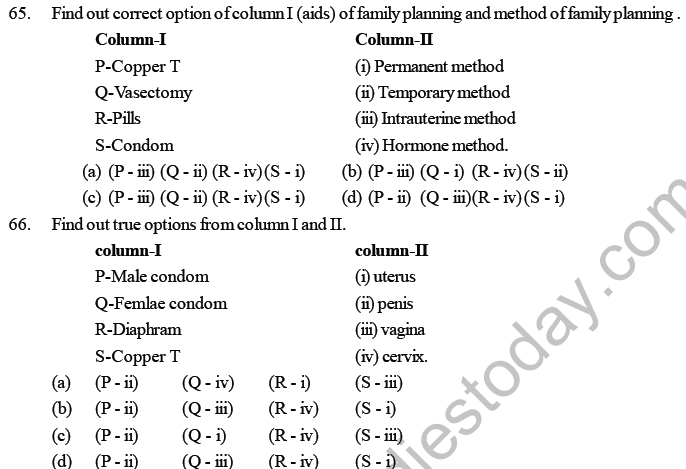
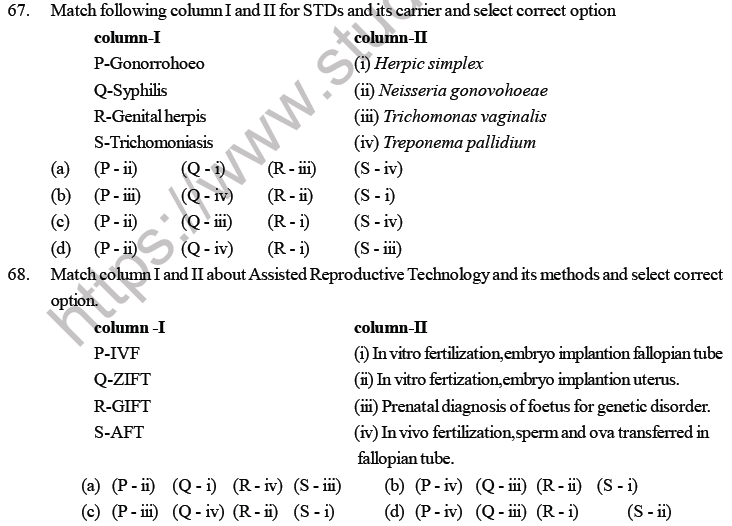
69. Which is not true for population explosion ?
(a) Increased rate of industrialization and urbanization.
(b) Encrochment on land ,air and water.
(c) scarecity of food , habitat and clothes.
(d) country develops more.
70. Given statement A and reason-R find out correct statement out of given option .
A (statement) Reproductive health is define by WHO.
R (reason) It is a world health organization.
(a) A is correct but R is an explaination of X.
(b) A is correct but R done give correct explaination of X
(c) A is correct and reason R is wrong.
(d) A is not correct and reason R is correct.
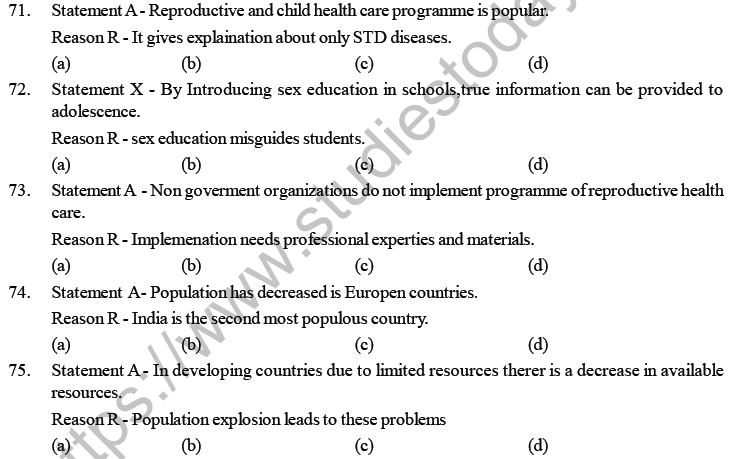

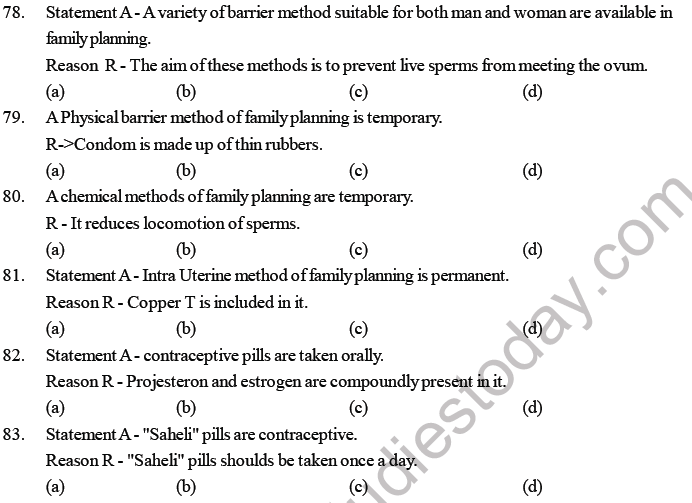
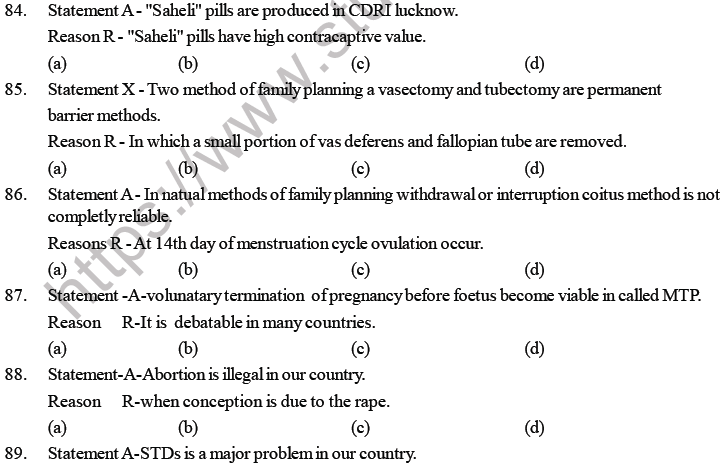
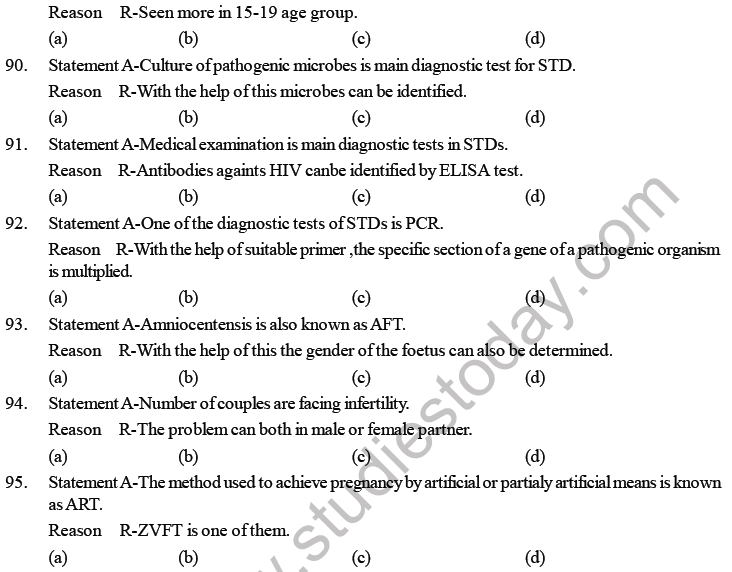
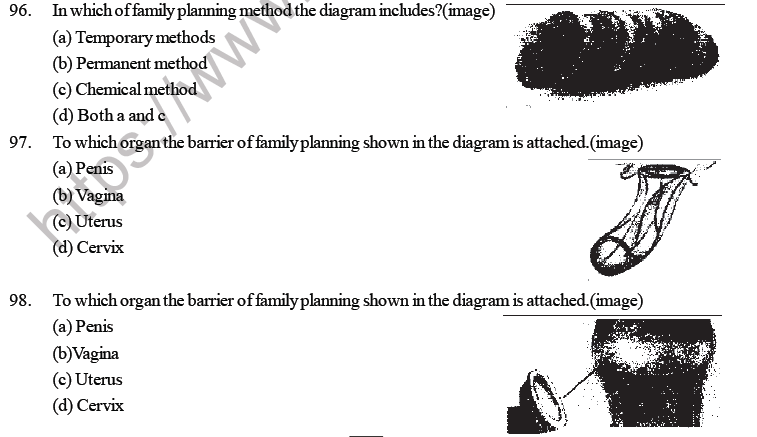
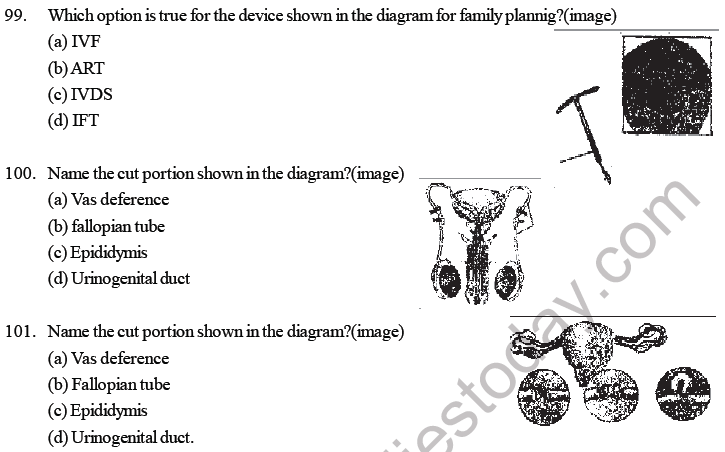
102.What is the function of copper-T
(a) Checks mutation (b) Stop fertilization
(c) Stops zygote formation (d) Stops oblituation of blastocoel
103. A contraceptive pill contains_____
(a) Progesterone and estrogen (b) Oxytocin
(c) Relaxin (d) None of these
104. Trade name of weekly oral contraceptive pill is
(a) Mala (b) Shaheli (c) Mala-A (d) Mala-D
105. Amniocettesis involves the analysis of
(a) Amnion (b) Body fluid of amniotes
(c) Amino acids of protein (d) Amniotic fluid
106. In amniocentesis the fluid is taken from
(a) Foetal blood (b) Mother's blood
(c) Body fluid of mother (d) Fluid surrounding foetus
107. Daily oral contraceptive pill is
(a) Mala C (b) Mala M and Mala D
(c) Mala A (d) Mala D
108. Cu ions released from copper releasing Intra uterine devices (IUDS)
(a) Prevent ovulation (b) Make uterus unsuitable for implantation
(c) Increase phagocytosis of sperms (d) (b)and(c)both
109. Medical termination of the pregnancy (MTP)is considered safe up to how many weeks of pregnancy.
(a) Six weeks (b) Eight weeks (c) Twelve weeks (d)Eighteen weeks
110. Which one of the following is the most widely accepted method of contraception in india at present?
(a)IUDs (b) Cervical caps (c) Tubectomy (d) Diaphragms
111. Saheli is
(a) An oral contraceptive for females (b) A surgical sterilization method for females
(c) A diaphragm for females (d) A surgical method of sterilization in male

